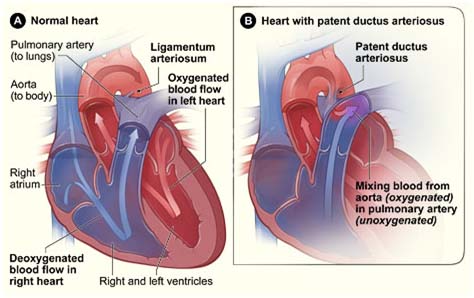

VSD treatment and surgery India offers information on VSD Doctor India, VSD treatment and surgery Hospital India, VSD treatment and surgery Abroad, VSD causes, symptoms, Risk factors, treatment and surgery.
Patent ductus arteriosus (PDA)
Patent ductus arteriosus (PDA) is a persistent, abnormal opening between two major blood vessels leading from the heart. Fortunately, this heart defect present at birth (congenital) often closes on its own or is readily treatable.
A small patent ductus arteriosus often doesn't cause symptoms. A doctor may discover it during a routine exam. An infant with a larger patent ductus arteriosus often has trouble gaining weight and exhibits other symptoms. An older child with a patent ductus arteriosus may not be as active as normal, may tire more easily and may have frequent lung infections.
Treatment options for repairing a patent ductus arteriosus include medications and surgery.

Symptoms
Signs and symptoms of a patent ductus arteriosus vary with the size of the defect and the gestational age of the infant at birth. A small patent ductus may cause no signs or symptoms, and may go undetected for some time. A larger one can cause signs of heart failure soon after birth. A premature infant may have other problems associated with prematurity, and related testing may uncover a heart defect.
Your doctor may first suspect a heart defect during a regular checkup while listening to your baby's heart through a stethoscope.
A large patent ductus arteriosus may cause:
![]() Poor eating, poor growth
Poor eating, poor growth
![]() Sweating with crying or play
Sweating with crying or play
![]() Persistent fast breathing or breathlessness
Persistent fast breathing or breathlessness
![]() Easy tiring
Easy tiring
![]() Rapid heart rate
Rapid heart rate
![]() Frequent lung infections
Frequent lung infections
Causes
Patent ductus arteriosus is common in premature babies, but rare in infants born at full term.
As a baby develops in the womb, a vascular connection (ductus arteriosus) between two major blood vessels leading from the heart — the aorta and pulmonary artery — is a normal and necessary part of fetal circulation. But, this duct is supposed to close within two or three days after birth once the newborn's heart adapts to life outside the womb. In premature infants, the duct often closes on its own within a few weeks of birth. But if the duct remains open, it's referred to as a patent ductus arteriosus.
The abnormal opening causes too much blood to circulate to the lungs and heart. If not treated, the blood pressure in the lungs may increase (pulmonary hypertension) and the heart may weaken.
Congenital heart defects arise from errors early in the heart's development — but there's often no clear cause. Genetics and perhaps environmental factors may play a role.
Risk factors
Congenital heart defects appear to run in families and sometimes occur with other genetic problems, such as Down syndrome. If you have a child with a congenital heart defect, a genetic counselor can predict the approximate odds that any future children could have one.
Patent ductus arteriosus is more common in premature babies. Also, babies with other types of congenital heart defects often have a patent ductus arteriosus.
Experiencing any of the following conditions during pregnancy can increase your risk of having a baby with a heart defect.
When to seek medical advice
Call your doctor if your infant or child:
Tests and diagnosis
Your baby's doctor may detect a heart defect when listening to his or her heart. Patent ductus arteriosus can cause a heart murmur that your doctor can hear through a stethoscope. If your doctor hears a heart murmur or finds other signs or symptoms of a heart defect, he or she may request one or more of these tests:
Occasionally, a small patent ductus arteriosus may not be detected until adulthood.
Treatments and drugs
In a premature infant, the patent ductus arteriosus often closes on its own in the weeks after birth. In a full-term infant, a patent ductus arteriosus usually will close within the first few days of life. If the defect doesn't close and is causing health problems, medications or surgery may be used to close it.
Medications
Doctors use nonsteroidal anti-inflammatory drugs (NSAIDs), such as ibuprofen or indomethacin, to help close a patent ductus arteriosus in premature infants. NSAIDs block the hormone-like chemicals in the body that keep the PDA open.
Surgery
Surgery to repair a patent ductus arteriosus involves patching or sewing shut the abnormal opening. This can be done through an incision in the side of the chest or by catheterization. In cardiac catheterization, a thin tube (catheter) is inserted into a blood vessel in the groin and threaded up to the heart. Through the catheter, a plug or coil may be deployed to close the ductus arteriosus. In surgery, the ductus is closed with a metal clip.
Preventive antibiotics
In the past, it was recommended that people with an unrepaired patent ductus arteriosus take antibiotics before dental work and certain types of surgical procedures to prevent infective endocarditis.
But new guidelines issued by the American Heart Association in 2007 have substantially revised this recommendation. After weighing the risks and benefits of preventive antibiotics, the reviewing committee found that the risks outweighed the benefits for most people, except a small group at high risk of serious complications of infectious endocarditis.
The reviewers found that random germs caused infectious endocarditis more frequently than did routine dental or medical procedures. They suggest a more effective strategy for preventing endocarditis may be to practice good oral hygiene and get regular dental checkups. They also noted that taking preventive antibiotics carries certain uncommon though possible risks, such as an allergic reaction, and may contribute to growing antibiotic resistance.
Because of these changes, preventive antibiotics are no longer recommended for many people with a patent ductus arteriosus. However, some people still need antibiotics, such as those who:
If you've been told you or your child needed to take antibiotics before any procedures in the past, talk with your doctor about how these new recommendations apply to you.
Surgery India Pediatric Surgery, India Cost Patent Ductus Arteriosus, PDA, Pediatric Surgery, India Patent Ductus Arteriosus, India Medical Vacations, India Medical Tourism, India Worldwide Hospitals, India Best Hospital,India Best Price Heart Surgery, India Aorta, India Pulmonary Artery, India Pda Ligation Surgery, India Cost PDA Ligation Surgery, India Patent Ductus Arteriosus Treatment, India Congenital Heart Disease, India Affordable Heart Surgeries, Surgery India Tour, India Low Cost Surgery, India Affordable Medical Treatments, India Overseas Patients, India Low Cost PDA, India PDA Ligation Surgery Hospital

